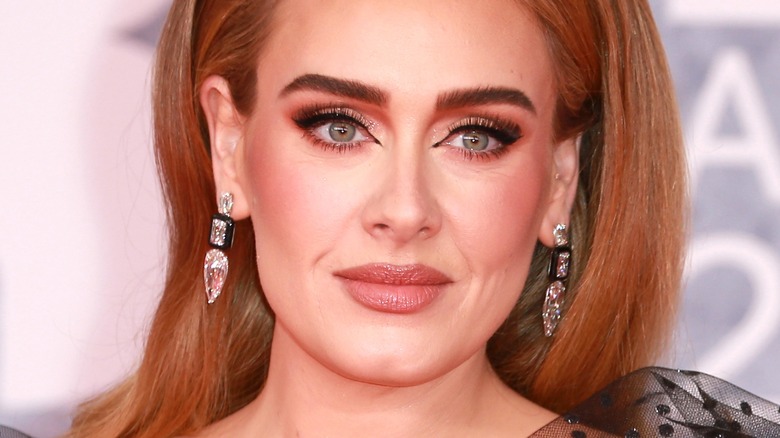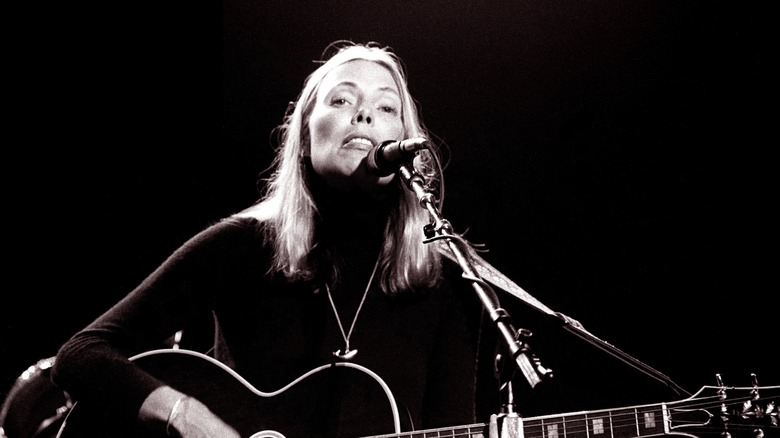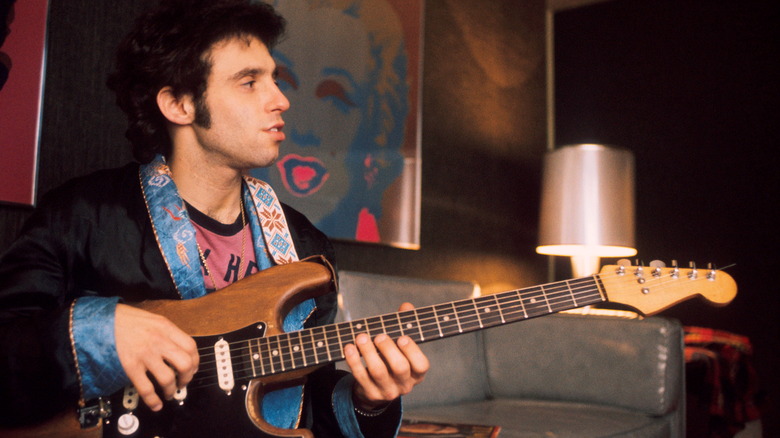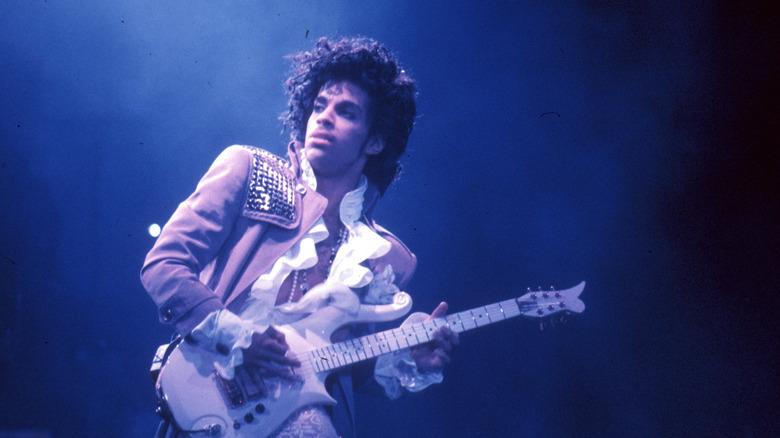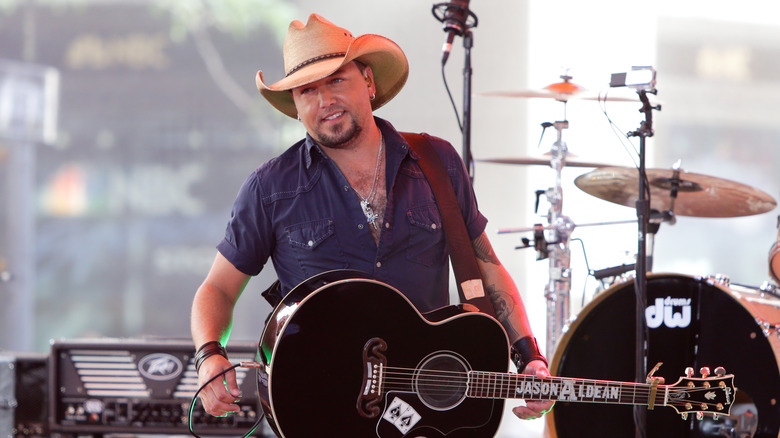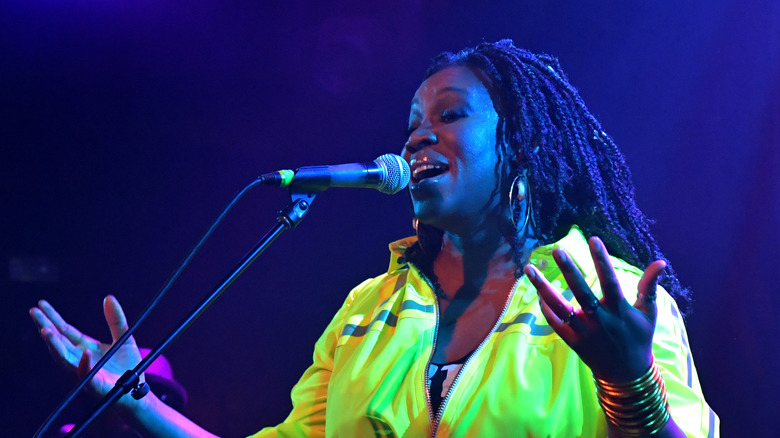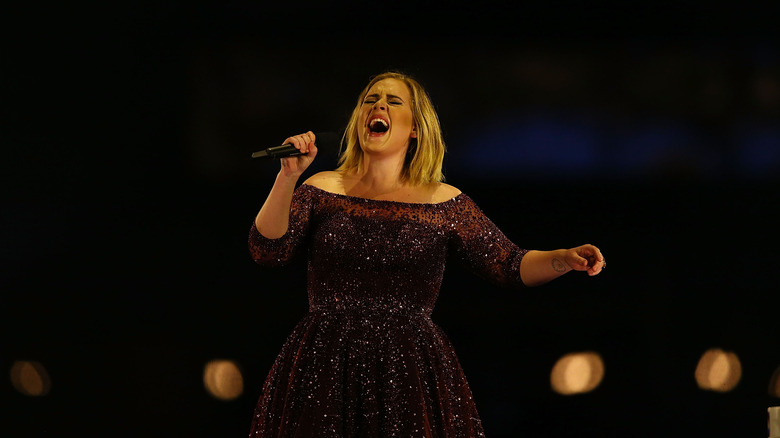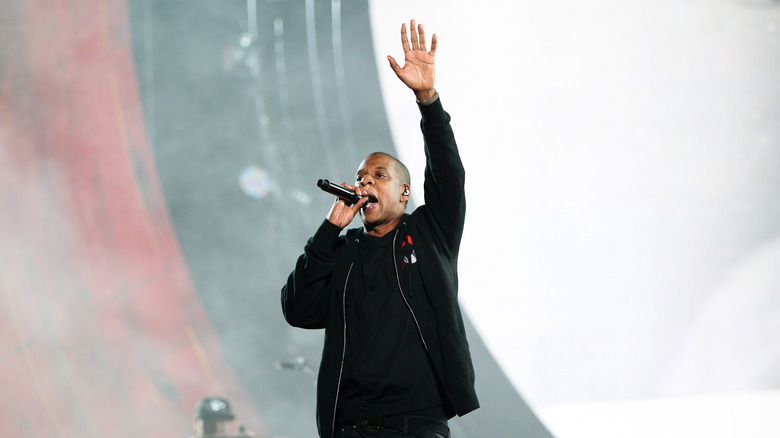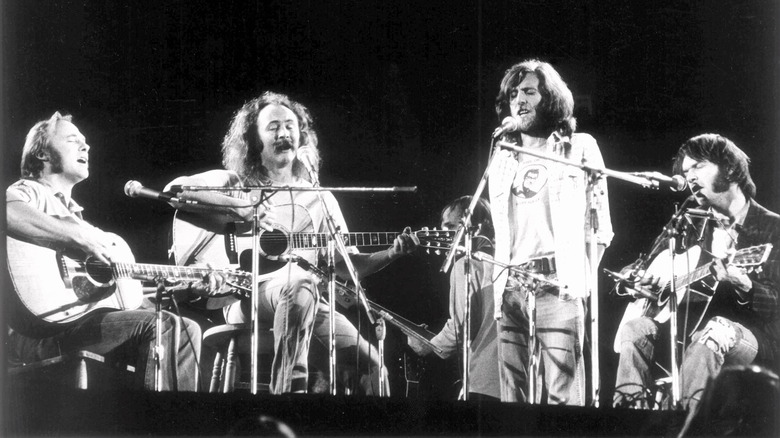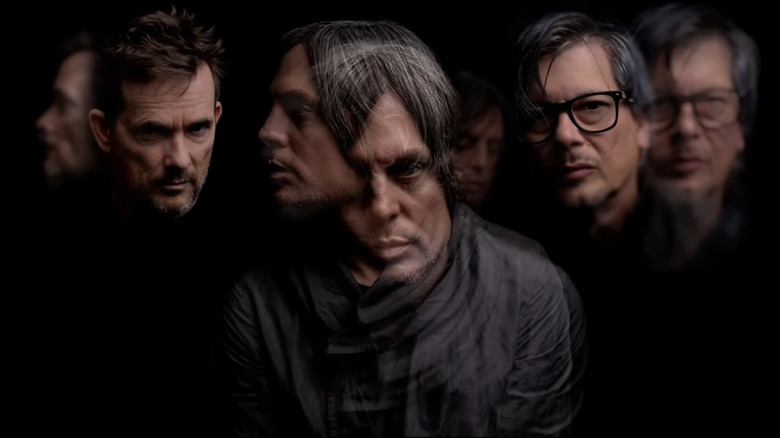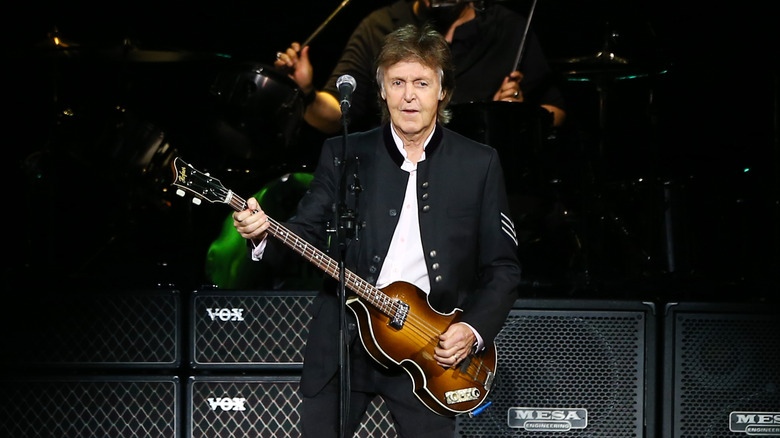Musicians Who've Demanded Their Music Be Removed From Streaming Sites
If you're a musician, there are a lot of reasons to hate streaming sites. Believe it or not, there was a time when people had to play their music locally—you could download a music file (typically an MP3) from the internet, but streaming was clunky and often impossible. Launched in 2008, Spotify changed all that, making it easy for people to stream their music.
But that also changed how musicians made money from their songs. Instead of getting a cut of every album or single sold through iTunes (remember iTunes?) or another platform, they're now getting paid per stream. And according to Spinditty, that's not a lot—Spotify claims it pays between $0.006 and $0.0084 per stream but is often lower than that. Spotify is one of the lower-paying streaming services, but none of them pay a lot of money.
In recent years, as Spotify and other streaming sites seek to move beyond music streaming into podcast production, there's another reason musicians hate them: The opinions and misinformation they allow on their platforms. Over the years, all these factors have resulted in an uneasy alliance between the streaming sites and the musicians who supply them with content—but that alliance has broken down plenty of times. Here are the musicians who've demanded their music be removed from streaming sites.
Neil Young
One of the most controversial examples of a musician pulling their songs from streaming occurred when Neil Young issued an ultimatum to Spotify around podcast megastar Joe Rogan in 2022. As reported by The Guardian, Young posted a letter to his website damning what he categorized as "misinformation" about vaccines and the COVID-19 on Rogan's podcast "The Joe Rogan Experience." The letter was later taken down when Young realized he didn't actually have the legal power to pull his catalog (he doesn't own the master recordings of his songs—Warner Bros. does, according to Fortune), but Spotify quickly complied with Young's request.
As noted by Rolling Stone, Young is in better shape to kick streaming services to the curb than most musicians. Aside from being a living rock legend with an army of fans who will likely follow him to wherever they can stream his songs, Young also launched the Neil Young Archives, a subscription service allowing his fans to stream his music in high definition (Young despises modern digital music formats, and even developed his own technology he claims is superior, though it failed to take off, per Consequence). The site already rakes in $600,000 a year for Young, which means he's probably not going to hurt for money as a result of leaving Spotify.
Joni Mitchell
Shortly after Neil Young announced his wish that Spotify choose between streaming his music and giving Joe Rogan a platform, his old friend Joni Mitchell announced she, too, was pulling her music from the streaming giant, according to NPR.
That Mitchell would be the first to support Young isn't too surprising. Mitchell and Young have been close for decades, Far Out Magazine reports. There's been a lot of speculation that they were once more than friends, though that's never been confirmed—but they definitely wrote songs about each other, and have maintained a relationship for almost 60 years. It makes perfect sense that Mitchell would seek to support a friend she's known for so long and so well.
Like Young, however, Mitchell experienced firsthand the complexities and bureaucracy of the modern music world. According to Variety, while most of Mitchell's albums were removed from Spotify very quickly, a handful remained available to stream for no clear reason. Some of those albums were owned by Universal Music Group, but the company complied with Young's request, so it's unlikely to be their fault. And several of the lingering albums are actually owned outright by Mitchell, making their continued presence a mystery.
Nils Lofgren
Younger music fans may not have immediately recognized the name, but Nils Lofgren's request that Spotify remove all of his music in 2022 was a pretty big deal. As noted by Rolling Stone, Lofgren's been a legendary musician for more than 50 years, both as a solo artist and as a member of Crazy Horse (which famously backed up Neil Young) and Bruce Springsteen's E-Street Band.
Lofgren announced his request after becoming aware of Neil Young's decision to remove his music from Spotify. According to ABC10, Lofgren made the decision because he agreed with Young that Spotify was "promoting lies and misinformation" around the COVID-19 pandemic and the efficacy and safety of vaccines. While Neil Young specifically focused his concerns on podcast superstar Joe Rogan, Lofgren instead focused on the "heroic" healthcare professionals who have borne the brunt of the pandemic for the last few years.
NME notes that because of Lofgren's complex and storied musical career, pulling his music from the streaming giant isn't easy. Lofgren was able to quickly pull the last 27 years of his career from Spotify, but his earlier music is owned by different record labels, and his work with Crazy Horse and The E-Street Band involves many other musicians, complicating matters. All Lofgren can do in terms of his earlier work is ask that his wishes are honored.
Prince
Prince was a musician who never backed down from a fight, especially when it involved his music. This is the artist who famously changed his legal name to a symbol to protest his contract with Warner Brothers, after all. And Billboard reports that Prince worked tireless to regain full control of his music, ultimately succeeding and setting up his own distribution network.
So it wasn't really a surprise when Prince suddenly removed all of his music from most streaming services in 2015. According to The New York Times, the move was strategic—Prince left his music on Jay-Z's Tidal service, which was perceived to be a much more artist-friendly platform. The fact that the decision to remove Prince's music came one day after Apple Music launched is significant: Apple's new streaming service was heavily criticized on its debut for refusing to pay royalties on songs streamed during its free trial period. According to Rolling Stone, a month later Prince signed an exclusive deal with Tidal.
When Prince died unexpectedly in 2016, he left no coherent instructions about his estate. After the exclusive deal with Tidal ended, Prince's estate returned his entire catalog to most streaming services. Whether this would have been what Prince himself wanted is a question that will probably never be answered.
Taylor Swift
When she's not busy being one of the most successful and prolific singer-songwriters of the modern era, Taylor Swift often finds time to be an advocate for paying musicians fairly. As noted by The Guardian, in 2014, Swift put her money where her mouth was and pulled her entire music catalog off of Spotify to protest the extremely low payouts musicians received from the platform. While her official statement on the removal stated bluntly that "valuable things should be paid for" and "music should not be free," many noted that she timed her announcement to coincide with then-rival Katy Perry's album release.
According to Rolling Stone, Swift's record label claimed the move was also an act of "respect" for her fans, claiming that someone who paid for Swift's new album or song would feel disrespected if someone else could listen to it for free. Swift was pretty committed, though—it took her three years to allow her music back onto Spotify.
As noted by The Verge, Spotify wasn't the only target of Swift's anti-streaming campaigns. She very publicly complained about Apple Music's decision not to pay artists royalties for songs streamed during free trial periods—a move that almost certainly pushed Apple to change their policies on the matter. Today Swift's music is available on most streaming services, probably because if a musician isn't streamable, they basically don't exist in the modern day.
Jason Aldean
According to Rolling Stone, Jason Aldean's 2014 album "Old Boots, New Dirt" set a record for the best-ever country music debut on Spotify with 3 million streams in its first week. Then Aldean abruptly removed the album from the streaming platform, initially without explanation. Aldean later confirmed speculation that his move was inspired by Taylor Swift's decision to remove her entire catalog from Spotify to protest the low rates it paid songwriters. As reported by Taste of Country, Aldean explained his decision by saying, "I'm an artist whose career has been built by the songwriters, publishers, producers, and engineers that line Music Row in Nashville. What they do has value."
Aldean's previous albums remained streamable, however. And Rolling Stone reports that like many artists at the time, he partnered with Jay-Z's newly-launched Tidal service, citing its better terms for songwriters and artists.
As noted by MusicRow, less than a year later, he returned "Old Boots, New Dirt" to Spotify, claiming he was responding to fan demand. The removal from streaming services didn't seem to hurt album sales—the disc debuted at No. 1 on the Billboard 200 and was certified platinum with more than a million copies sold just a few months later, according to The Boot. It was the only country album to do so in 2014.
India.Arie
Some artists remove their music from streaming platforms because of perceived disinformation. Some do so to protest the financial arrangements that hurt less-famous artists disproportionately. India.Arie had a much more visceral reason to pull her music from Spotify: Racist language.
According to Rolling Stone, Arie's decision was inspired by Neil Young's push to remove his music from Spotify in protest of Joe Rogan's misinformation around COVID-19 and vaccines, but it was an episode of Rogan's podcast, "The Joe Rogan Experience," that featured Rogan discussing what it means to be Black with Jordan Peterson that drove Arie to pull her music. Billboard notes that Arie also cited Spotify's history of paying extremely low rates to artists as a factor.
Variety reports that after announcing her decision to pull her music, Arie posted a video clip splicing together 24 times that Rogan used a controversial racial epithet on his podcast. Spotify removed 70 episodes of "The Joe Rogan Experience" as a result of this new controversy, and The New York Times reports that Rogan posted a lengthy apology video, admitting his use of the word was wrong and describing it as the "most regretful and shameful thing" he's ever had to talk about publicly.
Adele
Back in 2015, Adele's third album, "25," was easily the biggest release of the year. As noted by Billboard, the album earned a diamond certification of more than 10 million copies sold in less than a year after its release. That put Adele in the very small group of artists who don't need streaming platforms to succeed. And as if to prove it, just 24 hours before the album was released, Adele pulled the option of streaming "25" from all streaming platforms, according to The New York Times.
Billboard notes that Adele's previous albums, "19" and "21" were still available for streaming, prompting speculation that the move was more about boosting physical record sales than taking any sort of stand against streaming in general. And this is supported by Adele's decision to release "25" to streaming less than a year later—when "25" was approaching 20 million in worldwide sales, according to Music Business Worldwide.
Six years later, Adele had shifted her strategy towards influencing how streaming is experienced. As noted by NPR, when the singer released "30" she convinced Spotify to remove the shuffle button from the album's landing page so that listeners would have to play the album in sequence as she intended.
Jay-Z
In 2017, fans of legendary rapper Jay-Z woke up one day to discover that his music catalog had virtually vanished from most streaming platforms. On Spotify, as noted by MTV, only a handful of Jay-Z collaborations remained on the platform. The explanation was obvious to everyone: As reported by Investopedia, Jay-Z had purchased Tidal in 2015 and re-launched it as a streaming platform focused on sound quality and paying fair rates to artists. Allowing his music to be hosted on other streaming sites didn't make much sense when he was trying to build Tidal into a major player. Removing his albums from other sites made Tidal the exclusive spot for streaming Jay-Z's classic albums like "The Blueprint."
As reported by The Guardian, Jay-Z counted among his equity partners in Tidal some other major music stars, including his wife Beyoncé, Coldplay, Jason Aldean, Kanye West, and Madonna. And part of the strategy for Tidal from the very beginning was the concept of exclusivity—the idea was to release some music exclusively on Tidal for a time before expanding access to other platforms.
Unfortunately for Jay-Z, it didn't work. Forbes notes that Tidal never quite broke through, and in 2019, Jay-Z brought his catalog back to Spotify and other streaming sites. And Vox notes that less than two years later, Jay-Z sold Tidal to Twitter founder Jack Dorsey's company Square for close to $300 million.
Crosby, Stills & Nash
Band drama is the best drama, and it doesn't get much more dramatic than the long-simmering feud between Neil Young, David Crosby, Graham Nash, and Stephen Stills. The drama crisscrosses in several directions. As noted by Rolling Stone, Crosby has made comments about Neil Young's partner, Daryl Hannah, that Young didn't appreciate, and also managed to irritate Nash over some "nasty emails." And that's just the recent drama—as noted by The Toronto Sun, Crosby, Stills, Nash & Young was probably one of the most dysfunctional rock supergroups to ever record.
And yet, when Young removed his music from Spotify over Joe Rogan's comments around the COVID-19 vaccine, Graham Nash was one of the first artists to join him. As reported by The Guardian, Nash said he completely agreed with Young's stance and requested that his solo work be removed from the streaming platform. And as noted by NPR, just a few days later David Crosby and Stephen Stills joined him in solidarity with their longtime collaborator, asking that all recordings by the various incarnations of the group as well as their solo projects be removed. Most surprisingly, as reported by Variety, the request was made in a unified statement, marking one of the rare times in recent years when these legendary musicians have acted as one.
Failure
Failure is a band that proves music offers second chances. As noted by Rolling Stone, the band released three albums in the grunge-heavy 1990s, then broke up in 1997 after modest success but no big breakthrough. But as reported by Paste Magazine, Failure developed a cult following after their breakup, and their third album, "Fantastic Planet," grew in popularity. In fact, the band Paramore released a popular cover of their song "Stuck On You" back in 2013. Failure reunited around the same time and has released three albums since then.
According to NME, in 2022, Failure announced that it would be removing the parts of its catalog it directly controls from Spotify after Neil Young's announcement that he would be doing the same. Like Young, Failure noted Spotify's willingness to promote vaccine misinformation on its platform as a major reason for the decision, but they also cite what they regard as unfair payment practices, which they believe "devalues our product." Loudwire reports that Failure elaborated, noting that they had to cancel tour dates due to COVID-19, and that Spotify's promotion of vaccine misinformation literally threatened their bottom line, noting that "Spotify's insistence on spreading misinformation ... directly endangers our band's supply chain, namely, human beings in a room with big speakers."
Paul McCartney
When you're trying to make a point, it helps to be one of the most famous musicians on the planet. There's no doubt that Sir Paul McCartney—former Beatle, founder of the band Wings, and prolific solo artist who scored his most recent No. 1 album in 2021 at the age of 79, according to Forbes—doesn't need any more money. But as noted by CNET, back in 2012 he pulled his solo music from all streaming services in protest over the low rates they paid artists—although Endgadget notes that he announced the move just before launching an exclusive streamed concert on iTunes, which certainly seems a bit cynical, especially since McCartney's music eventually found its way back to streaming services.
But this wasn't a one-time thing for McCartney. As reported by Digital Music News, McCartney continues to try to leverage his celebrity and streaming power to help lesser-known musicians. McCartney has described the amount of money paid to artists for streaming as "such a small percentage." And as noted by Variety, McCartney and Coldplay's Chris Martin were the only musicians from Spotify's Top 50 who signed an open letter demanding reform of streaming payments in the United Kingdom.
